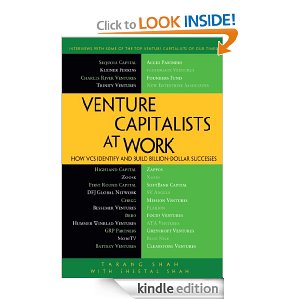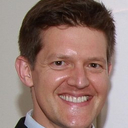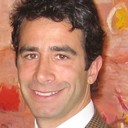Venture Capitalists at Work – Part 1
by Scott Edward Walker on June 26th, 2012INTRODUCTION
I just finished reading the book Venture Capitalists at Work, which is a collection of solid interviews by Tarang Shah of certain highly-successful investors. I have set forth below some nuggets for entrepreneurs. This is part one of a three-part series. I hope entrepreneurs find a few of the quotes helpful and get a better understanding of how VC’s think. Thanks, Scott
ROELOF BOTHA, Partner at Sequoia Capital
“The key to start-up success is purity of motivation. The most successful entrepreneurs tend to start with a desire to solve an interesting problem—one that’s often driven by a personal frustration.” –Roelof Botha (p.1)
“If you think about the sort of sacrifice and endurance an entrepreneur needs to succeed, I just do not see how money is a sufficient motivator.” –Roelof Botha (p.2)
“There isn’t a single company we’ve worked with that, 12 to 24 months later, was on the exact same path.” –Roelof Botha (p.2)
“‘A’ people do not want to work for ‘B’ people. An ‘A’ person who cannot communicate the value proposition of his or her innovation to ten to fifteen great ‘A’ hires will struggle to build a business.” –Roelof Botha (p.5)
MIKE MAPLES, Managing Partner at FLOODGATE
“I invest in stubborn entrepreneurs who chase huge opportunities and hopefully several of them turn out to be right.” –Mike Maples (p.11)
“I think the entire [VC] business is finding those exceptional, awesome companies. If you find one of them every five years, nothing else matters. There is nothing else, and I think people forget that.” –Mike Maples (p.12)
“We do not look at serial entrepreneurship as a positive trait. We look at authenticity and unconventional, proprietary insight as the key difference.” –Mike Maples (p.12)
“Every startup has a bunch of near-death experiences and if you do not love your idea with all your passion, you will give up.” –Mike Maples (p.16)
GEORGE ZACHARY, Partner at Charles River Ventures
“I look for founders at the seed stage and Series A stage who basically can quickly explain to me what it is that they are doing, why it is so important, and in a way that the passion comes from them authentically, not like somebody taught them how to make a presentation.” –George Zachary (p.27)
“[W]hen people feel that there is a mission that they can engage themselves in, something they believe in, they are happy to join a company like that.” –George Zachary (p.34)
“A lot of founders do not realize that a few hits generate all the gain and what venture people want to go after are the really bold ideas that could be one of those…hits.” –George Zachary (p.36)
“[W]hen you get invited to present to investors, bring your founding team. I want to meet not just the founder, I want to meet the other people in the company. That tells me a lot about the founder’s ability to get other great co-founders involved.” –George Zachary (p.37)
SEAN DALTON, Partner at Highland Capital Partners
“I look for a maniacal commitment to work hard and succeed. What underlies that is a real authenticity and real passion to succeed and create a great company. That goes back to how well I know the person I am investing in.” –Sean Dalton (p. 42)
“You cannot teach someone to work hard. You either do or you do not.” –Sean Dalton (p. 42)
“I do not envy start-up CEOs. I think it is the single, loneliest role in our entire ecosystem. That is why we get back to stage one, which is no matter what style of CEO you really are, if you really can develop an open and trusting relationship with your board, you will be better off for it.” –Sean Dalton (p. 43)
“[W]hat is most important is finding a VC that will be a great partner to you. That’s generally not something you can discover in a few days while you are evaluating several term sheets.” –Sean Dalton (p. 52)
HOWARD MORGAN, Managing Partner at First Round Capital
“We look for integrity first and foremost.” –Howard Morgan (p. 84)
“I like to quote Stephen Sondheim from one of his songs – ‘Having just the vision is no solution. Everything depends on execution’.” –Howard Morgan (p. 85)
“Keep sensitive, in everything you do, to the pain points you feel. Where you feel that pain, see how you can solve it. That is the key.” –Howard Morgan (p.90)
TIM DRAPER, Founder and Managing Director at Draper Fisher Jurvetson
“Building a business is a skill. Changing the world is a mission. People are attracted to the missionary.” –Tim Draper (p. 94)
“Usually the best pivots are when the entrepreneur is reacting to a fundamental change or new technology that enters the market. The worst ones are just changing to try to convince the investors to keep putting money in.” –Tim Draper (p. 94)
HARRY WELLER, General Partner at NEA
“A great idea is only one-tenth of the story.” –Harry Weller (p.117)
“[T]he entrepreneur has to be receptive of the value that the VC really brings to the table—the knowledge and network and the been-there-done-that scenarios. And when the rubber meets the road, the entrepreneur and the VC have to establish and maintain trust, and trust each other’s motives. It is hard to do.” –Harry Weller (p.117)
“This is how I like to describe it to entrepreneurs. I am handing you a part of my career. I can only focus on eight things at a time, so you have one-eighth of my career in your hands. So I need to know you.” –Harry Weller (p.121)
“A lot of people say it’s management, management, management. But it is actually entrepreneur, entrepreneur, entrepreneur. What is the character of the entrepreneur? What is the character of that person?” –Harry Weller (p.131)
DAVID COWAN, Partner at Bessemer Venture Partners
“I’ve seen companies that have some brilliant application that people love, but they don’t really have a culture of constantly trying to make it better, doing A/B testing, always iterating.” –David Cowan (p.136)
“For any internet business, [there] are…two key numbers that matter. Nothing else matters. Cost per acquisition and lifetime value. Everything falls into those two numbers.” –David Cowan (p.137)
“[T]he fundamental characteristic that I’m looking for in an entrepreneur—not just because I want to have a good working relationship, but because I think it’s key to success—is intellectual honesty. This is the key characteristic that I’m looking for in entrepreneurs when I meet them.” –David Cowan (p.141)
“If you’re not making mistakes, there’s something wrong.” –David Cowan (p. 146)
“Listen to the data.” –David Cowan (p. 147)
MITCHELL KERTZMAN, Managing Director at Hummer Winblad Venture Partners
“I like entrepreneurs who are building businesses because they have to. They have so much passion, so much belief in what they are doing that they almost don’t have a choice but to build it.” –Mitchell Kertzman (p. 169)
“One of the great failings I see is entrepreneurs who are afraid to hire people who are better than they are.” –Mitchell Kertzman (p. 172)
“[I]f any successful entrepreneurs don’t mention luck as one of the forces that played a role in their success, they are giving themselves too much credit.” –Mitchell Kertzman (p. 173)
SCOTT SANDELL, General Partner at NEA
“In my experience, you learn most everything you need to know about somebody by negotiating a term sheet with them. That is the most important part of the due-diligence process.” –Scott Sandell (p. 181)
“The first filter for me is the people. Are they extraordinary people? Are they people you can live with through thick and thin? Because there will always be thin. Are they people who really want to build a big company? Are they not in it to flip it and get rich?” –Scott Sandell (p. 185)
“I think the single most important question is: how strong is the value proposition? Is this something that is a must-have item? Is it something that could change your life or business, the way you work, the way you play? Is this a game changer?” –Scott Sandell (p. 186)
GUS TAI, General Partner at Trinity Ventures
“I believe the most important characteristic of a successful company founder is that he or she has very deep integrity…I mean integrity in two ways: the traditional moral sense, but also in the personal sense. They need to communicate their conviction in how they’re deeply aligned in who they are.” –Gus Tai (p. 195)
“What successful entrepreneurs and companies do is they mobilize action. Entrepreneurism is about bias for action….And passion really helps with that. Passion is the internal battery that provides the energy for the bias for action.” –Gus Tai (p. 196)
Tags: Bessemer, David Cowan, Draper Fisher Jurvetson, entrepreneurs, First Round Capital, Floodgate, George Zachary Charles River, Gus Tai, Harry Weller, Highland Capital, Howard Morgan, Hummer Winblad, Mike Maples, Mitchell Kertzman, NEA, passion, pivot, Roelof Botha, Scott Sandell, Sean Dalton, Sequoia, startup, Tarang Shah, Tim Draper, Trinity, vc, venture, venture capitalists, venture capitalists at work












